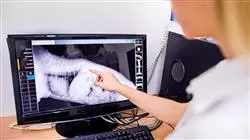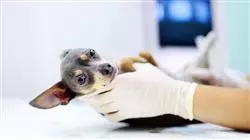University certificate
The world's largest faculty of veterinary medicine”
Introduction to the Program
Technological advances have favored the emergence of new diagnostic imaging techniques that are of great use to veterinarians”

Every day, veterinarians face numerous challenges in their practice that must be met with the utmost rigor and, to this end, they must be familiar with the latest practices in their field. In this case, the aim is to provide high-level training in veterinary radiology, focusing on the abdominal area, as well as on other types of diagnostic procedures that can be of great use in the treatment of small animals.
It must be taken into account that, in veterinary medicine, digestive conditions are the main reason for consultation and most of the time, their causes are easy to diagnose and treat by means of anamnesis and simple tests. The problems arise when the underlying conditons are less common, the patient is not used to working with certain tests or the treatments that should work, do not work. Therefore, this program aims to focus on the diagnostic imaging of these types of conditions.
In addition, veterinarians will learn the radiographic anatomy of the abdomen, as well as how to look for alterations in the number, size, shape, margins, density and location of the different organs, in order to be able to make differential diagnoses.
On the other hand, and taking into account that more and more families are deciding to keep exotic animals as pets in their homes, we have also developed a specific section dedicated to them, since the role of conventional radiology in medicine for birds, small mammals and reptiles is becoming increasingly important because it has been established as a fundamental diagnostic test in veterinary medicine.
In short, it is a program based on scientific evidence and daily practice, with all the nuances that each professional can contribute, so that the student can keep it in mind and compare it with the bibliography enriched by the critical evaluation that every professional must have.
Throughout this course, the student will learn about all the current approaches to the different challenges posed by their profession. A high-level step that will become a process of improvement, not only on a professional level, but also on a personal level. In addition, TECH assumes a social commitment: to help update highly qualified professionals and to develop their personal, social and labor skills during the development of the same. And, to do so, it will not only take you through the theoretical knowledge offered, but will show you another way of studying and learning which is more organic, simpler and more efficient. It will work to maintain motivation and to create a passion for learning; it encourages thinking and the development of critical thinking.
Our specialization will allow you to focus on learning new diagnostic imaging procedures, so that you acquire a superior level of training that will allow you to achieve success in your career"
This Postgraduate diploma in Abdominal Radiology and Other Diagnostic Procedures in Small Animals contains the most complete and up-to-date educational program on the market. The program's most important features include:
- The development of case studies presented by experts in Veterinary Radiology
- The graphic, schematic, and eminently practical contents with which they are created, provide scientific and practical information on the disciplines that are essential for professional practice
- Latest developments in Veterinary Radiology
- Practical exercises where self-assessment can be used to improve learning
- Special emphasis on innovative methodologies in Veterinary Radiology
- Theoretical lessons, questions to the expert, debate forums on controversial topics, and individual reflection assignments
- Content that is accessible from any fixed or portable device with an Internet connection
Once you register with us you will have access to a multitude of case studies that will facilitate the understanding of the theoretical contents"
TECH's teaching staff includes professionals belonging to the veterinary field, who contribute their work experience to this training, as well as renowned specialists from reference societies and prestigious universities.
The multimedia content, developed with the latest educational technology, will provide the professional with situated and contextual learning, i.e., a simulated environment that will provide immersive training programmed to train in real situations.
This program is designed around Problem Based Learning, whereby the specialist must try to solve the different professional practice situations that arise during the academic year. For this purpose, the professional will be assisted by an innovative system of interactive videos made by renowned and experienced experts in Veterinary Radiology.
Choose where and when to study, thanks to the convenience offered by our 100% online format"

You won’t find a program in the market that offers you everything we offer you: quality teaching, the most up-to-date contents and the best methodology in the current climate"
Why study at TECH?
TECH is the world’s largest online university. With an impressive catalog of more than 14,000 university programs available in 11 languages, it is positioned as a leader in employability, with a 99% job placement rate. In addition, it relies on an enormous faculty of more than 6,000 professors of the highest international renown.

Study at the world's largest online university and guarantee your professional success. The future starts at TECH”
The world’s best online university according to FORBES
The prestigious Forbes magazine, specialized in business and finance, has highlighted TECH as “the world's best online university” This is what they have recently stated in an article in their digital edition in which they echo the success story of this institution, “thanks to the academic offer it provides, the selection of its teaching staff, and an innovative learning method aimed at educating the professionals of the future”
A revolutionary study method, a cutting-edge faculty and a practical focus: the key to TECH's success.
The most complete study plans on the university scene
TECH offers the most complete study plans on the university scene, with syllabuses that cover fundamental concepts and, at the same time, the main scientific advances in their specific scientific areas. In addition, these programs are continuously being updated to guarantee students the academic vanguard and the most in-demand professional skills. In this way, the university's qualifications provide its graduates with a significant advantage to propel their careers to success.
TECH offers the most comprehensive and intensive study plans on the current university scene.
A world-class teaching staff
TECH's teaching staff is made up of more than 6,000 professors with the highest international recognition. Professors, researchers and top executives of multinational companies, including Isaiah Covington, performance coach of the Boston Celtics; Magda Romanska, principal investigator at Harvard MetaLAB; Ignacio Wistumba, chairman of the department of translational molecular pathology at MD Anderson Cancer Center; and D.W. Pine, creative director of TIME magazine, among others.
Internationally renowned experts, specialized in different branches of Health, Technology, Communication and Business, form part of the TECH faculty.
A unique learning method
TECH is the first university to use Relearning in all its programs. It is the best online learning methodology, accredited with international teaching quality certifications, provided by prestigious educational agencies. In addition, this disruptive educational model is complemented with the “Case Method”, thereby setting up a unique online teaching strategy. Innovative teaching resources are also implemented, including detailed videos, infographics and interactive summaries.
TECH combines Relearning and the Case Method in all its university programs to guarantee excellent theoretical and practical learning, studying whenever and wherever you want.
The world's largest online university
TECH is the world’s largest online university. We are the largest educational institution, with the best and widest online educational catalog, one hundred percent online and covering the vast majority of areas of knowledge. We offer a large selection of our own degrees and accredited online undergraduate and postgraduate degrees. In total, more than 14,000 university degrees, in eleven different languages, make us the largest educational largest in the world.
TECH has the world's most extensive catalog of academic and official programs, available in more than 11 languages.
Google Premier Partner
The American technology giant has awarded TECH the Google Google Premier Partner badge. This award, which is only available to 3% of the world's companies, highlights the efficient, flexible and tailored experience that this university provides to students. The recognition as a Google Premier Partner not only accredits the maximum rigor, performance and investment in TECH's digital infrastructures, but also places this university as one of the world's leading technology companies.
Google has positioned TECH in the top 3% of the world's most important technology companies by awarding it its Google Premier Partner badge.
The official online university of the NBA
TECH is the official online university of the NBA. Thanks to our agreement with the biggest league in basketball, we offer our students exclusive university programs, as well as a wide variety of educational resources focused on the business of the league and other areas of the sports industry. Each program is made up of a uniquely designed syllabus and features exceptional guest hosts: professionals with a distinguished sports background who will offer their expertise on the most relevant topics.
TECH has been selected by the NBA, the world's top basketball league, as its official online university.
The top-rated university by its students
Students have positioned TECH as the world's top-rated university on the main review websites, with a highest rating of 4.9 out of 5, obtained from more than 1,000 reviews. These results consolidate TECH as the benchmark university institution at an international level, reflecting the excellence and positive impact of its educational model.” reflecting the excellence and positive impact of its educational model.”
TECH is the world’s top-rated university by its students.
Leaders in employability
TECH has managed to become the leading university in employability. 99% of its students obtain jobs in the academic field they have studied, within one year of completing any of the university's programs. A similar number achieve immediate career enhancement. All this thanks to a study methodology that bases its effectiveness on the acquisition of practical skills, which are absolutely necessary for professional development.
99% of TECH graduates find a job within a year of completing their studies.
Postgraduate Diploma in Abdominal Radiology and Other Diagnostic Procedures in Small Animals
.
At TECH Global University, we present you our Postgraduate Diploma in Abdominal Radiology and Other Diagnostic Procedures in Small Animals program, a unique opportunity to acquire specialized knowledge in the field of veterinary radiology. In this program, we provide you with the flexibility of online classes, allowing you to access quality education from anywhere and at any time that fits your schedule.
Our team of expert veterinary radiology professionals will guide you through a comprehensive and up-to-date curriculum, where you will be immersed in the theoretical and practical fundamentals of abdominal radiology and other diagnostic procedures in small animals. You will learn the most advanced techniques in radiography, ultrasound and computed tomography, and develop skills to interpret radiologic images and diagnose diseases and conditions in animals.
The online classes offer a comprehensive and up-to-date curriculum.
Online classes offer numerous benefits, such as the convenience of learning from home, the ability to set your own pace of study and constant interaction with subject matter experts. In addition, you will have access to online educational resources, including teaching materials, how-to videos and interactive tools that will enhance your learning experience.
By completing this Postgraduate Diploma program, you will be prepared to meet the challenges of the veterinary radiology field and stand out as a highly skilled professional. You will expand your employment opportunities in veterinary clinics, specialty hospitals, and veterinary diagnostic centers.
At TECH Global University, we pride ourselves on offering quality academic programs that are tailored to the needs of professionals in the veterinary field. Join us and take a step forward in your career in veterinary radiology.
Enroll today!







